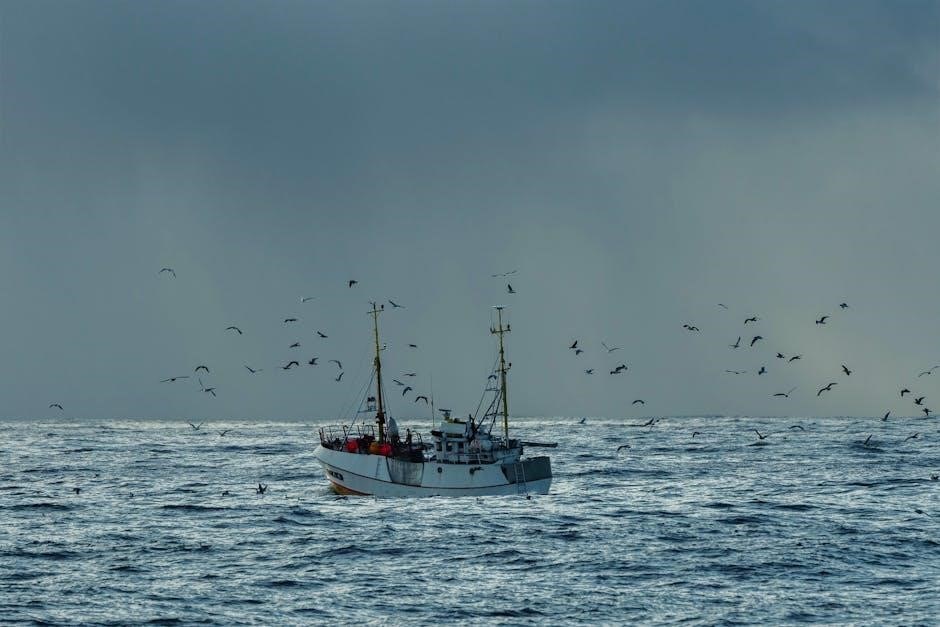
The 2024 NJ Saltwater Fishing Regulations provide essential guidelines for recreational and commercial anglers, ensuring sustainable fishing practices and fair access to marine resources․
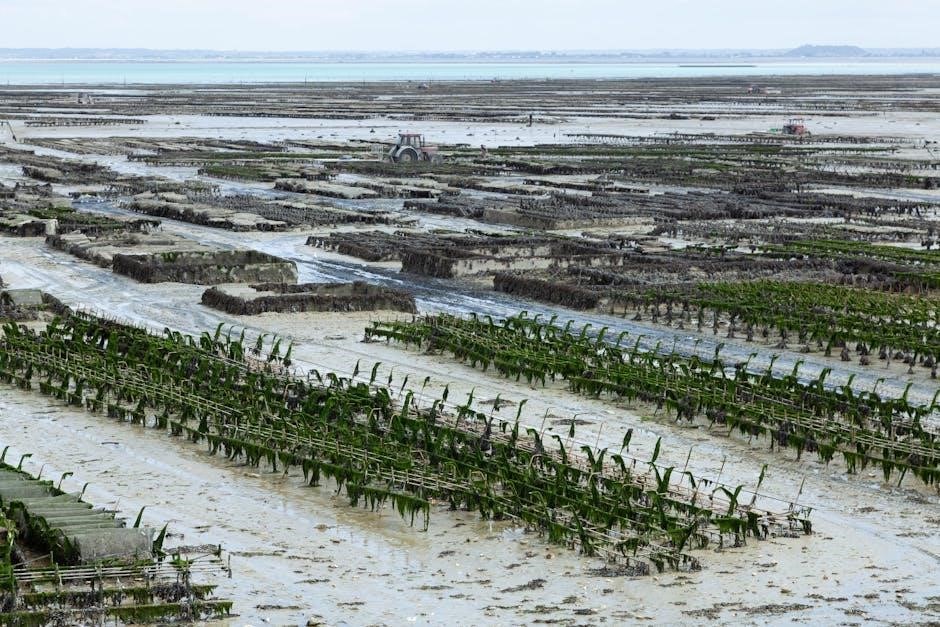
Overview of the Importance of Regulations
Regulations are crucial for maintaining healthy marine ecosystems and ensuring sustainable fishing practices․ They help conserve fish populations, protect habitats, and prevent overfishing․ Compliance with rules like minimum size limits, bag limits, and seasonal closures ensures fair access for all anglers․ Additionally, regulations minimize bycatch and protect endangered species․ Adhering to these guidelines supports the long-term health of marine life and guarantees fishing opportunities for future generations․ Proper enforcement also helps prevent illegal activities, maintaining the balance between recreational and commercial fishing interests;
Key Changes for 2024
For 2024, notable updates include the requirement of a Child Support Certification Form for saltwater registrations starting October 15․ Circle hook use is now mandatory when fishing with bait to reduce bycatch․ Possession limits for species like summer flounder have been adjusted, with Delaware Bay and Tributaries allowing 3 fish at 17 inches, while other marine waters permit 3 fish at 18 inches․ Additionally, downloadable marine regulation cards are now available, providing anglers with convenient access to size limits, seasons, and possession restrictions․
Licensing and Registration Requirements
Licensing is mandatory for saltwater fishing in New Jersey, with specific requirements for recreational and commercial activities․ Registration is free but required for all anglers․
Types of Licenses Available
New Jersey offers various saltwater fishing licenses to accommodate different angling needs․ Recreational anglers can choose from resident and non-resident options, while commercial licenses cater to industry professionals․ A free Saltwater Recreational Registry is mandatory for all marine anglers, ensuring compliance with federal and state regulations․ Licenses are issued annually, with fees varying based on residency and fishing type․ Eligibility criteria, such as age and residency, are outlined in the 2024 NJ Saltwater Fishing Regulations PDF․ Always check the NJ Fish and Wildlife website for the most accurate and up-to-date licensing information․
Cost and Eligibility Criteria
The cost of saltwater fishing licenses in New Jersey varies based on residency and license type․ Resident licenses are more affordable, while non-resident licenses incur higher fees․ Reduced-cost licenses are available for seniors and military veterans․ Eligibility criteria include age, residency status, and completion of a Child Support Certification Form for certain applicants․ Starting October 15, 2024, this form is mandatory for saltwater registrations․ Detailed fee structures and eligibility requirements are outlined in the 2024 NJ Saltwater Fishing Regulations PDF, ensuring transparency and ease of access for anglers․
New Jersey Saltwater Recreational Registry Program
Registration in the New Jersey Saltwater Recreational Registry Program is mandatory for all recreational saltwater anglers; The program is free and can be completed online at SaltwaterRegistry․nj․gov․ Starting October 15, 2024, applicants must complete a Child Support Certification Form as part of the registration process․ This program helps track fishing efforts and ensures compliance with federal and state regulations․ It also exempts anglers from federal registry requirements, saving them a $15 fee․ Registration is valid for one year and supports conservation efforts to maintain healthy marine resources․
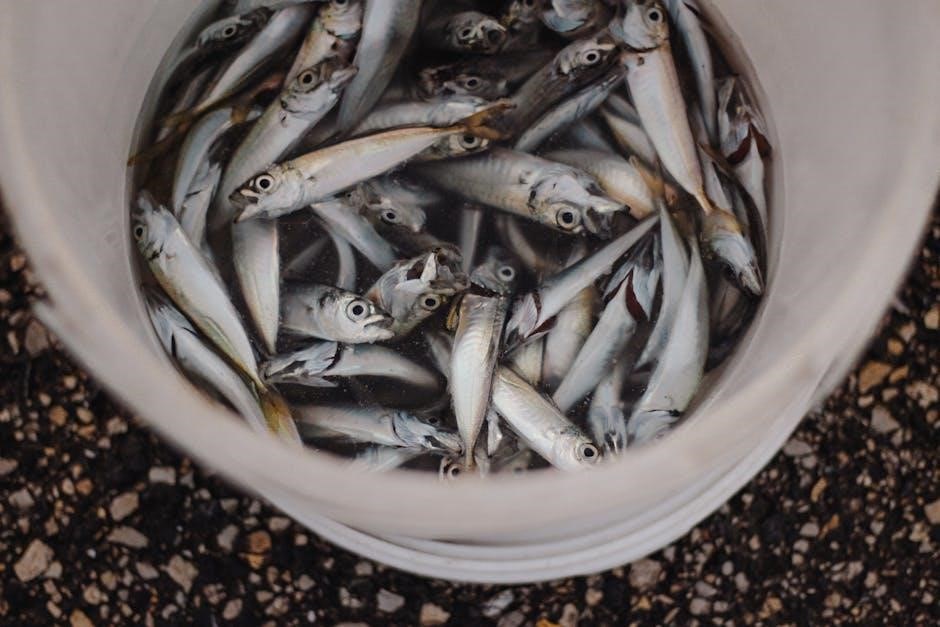
Seasons and Closures
Recreational fishing seasons vary by species, with specific closures to protect spawning and vulnerable populations․ Closed seasons prohibit retention, possession, and landing, requiring catch-and-release practices to conserve resources․
Recreational Fishing Seasons by Species
Recreational fishing seasons in New Jersey vary significantly by species to ensure sustainable harvesting․ Summer Flounder, for instance, has a season from May 17 to June 19 with a 12․5-inch minimum size and a bag limit of 10 per person․ Black Sea Bass season runs from May 17 to June 19, with a 12․5-inch minimum and a 10-fish limit․ Striped Bass regulations include a slot limit of 28–31 inches for one fish per day, while Bluefish have no closed season but a 5-fish daily limit․ Always consult the official 2024 NJ Saltwater Fishing Regulations PDF for precise details and updates․
Closed Seasons and Protected Areas
Closed seasons are implemented to protect vulnerable species during spawning or to replenish populations․ For example, weakfish fishing is closed year-round in Delaware Bay, while certain shellfish harvesting areas may be closed due to water quality․ Protected marine areas, such as artificial reefs and sensitive habitats, are designated to safeguard ecosystems․ These restrictions ensure long-term sustainability of marine resources․ Always refer to the 2024 NJ Saltwater Fishing Regulations PDF for specific closures and protected zones to avoid violations and support conservation efforts․
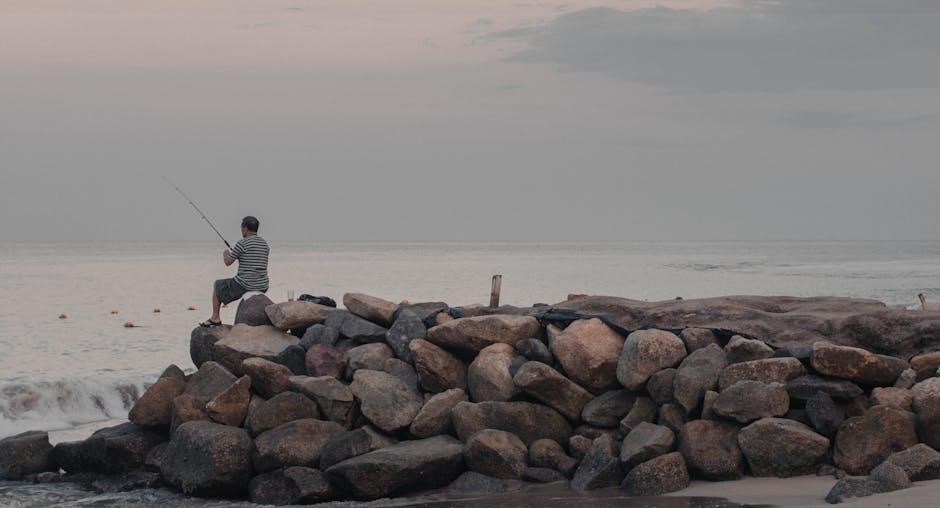
Size and Possession Limits
Size and possession limits are enforced to ensure sustainable fishing practices․ Key species like summer flounder, black sea bass, and bluefish have specific minimum sizes and daily bag limits, such as 18 inches for summer flounder in most areas, 12․5 inches for black sea bass with a 10-fish bag limit, and 8 inches for bluefish․ These regulations help maintain healthy fish populations and must be strictly followed by anglers․
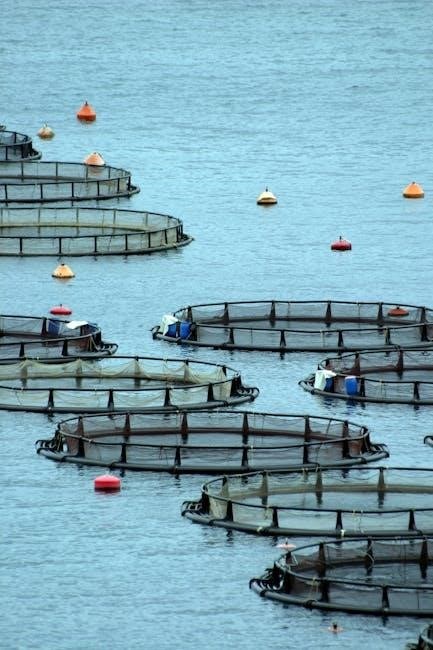
Minimum Size Limits for Key Species
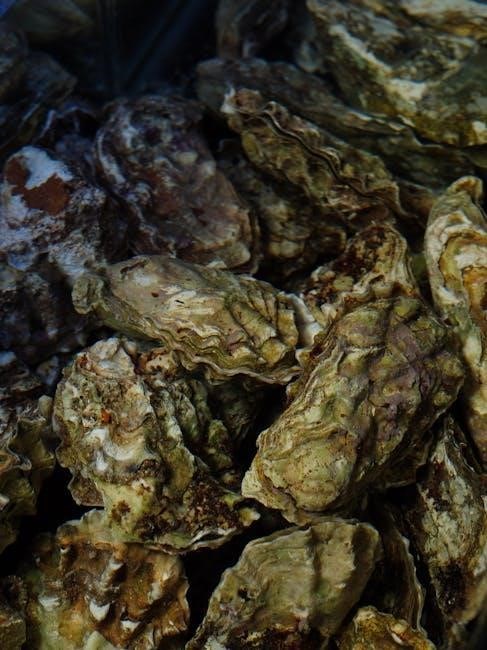
Key species like Summer Flounder (Fluke) have an 18-inch minimum size in most marine waters, while Delaware Bay and Tributaries allow 17 inches․ Black Sea Bass requires a 12․5-inch minimum, and Striped Bass must be between 28 and 31 inches․ Bluefish have no minimum size, but Scup (Porgy) require 10 inches․ These limits ensure fish reach maturity before harvest, promoting sustainable populations․ Anglers must measure fish from snout to tail, except for Black Sea Bass and sharks, which have specific guidelines․ Adhering to these limits is crucial for conservation and legal compliance․
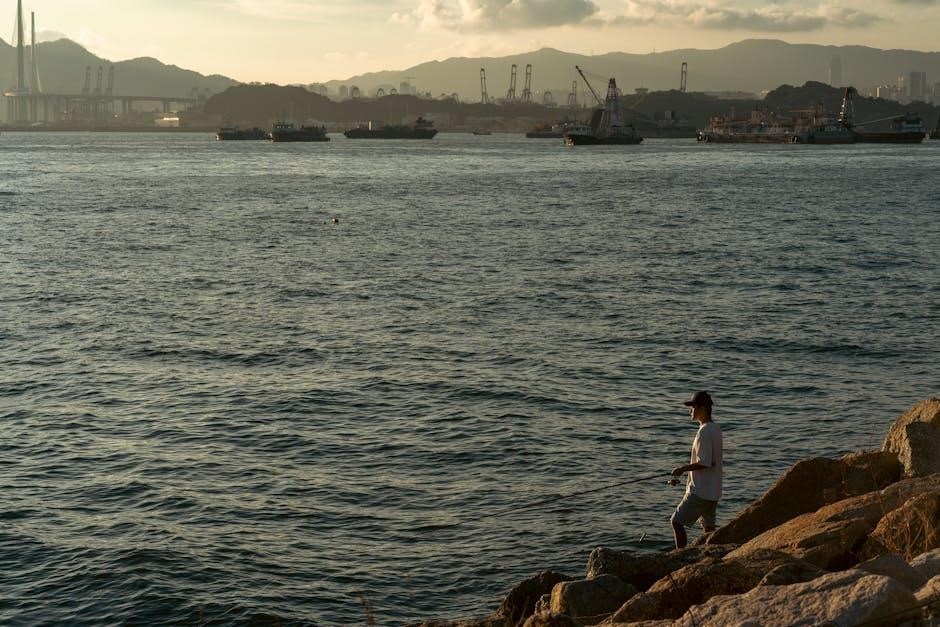
Daily Bag Limits and Vessel Restrictions
Daily bag limits vary by species to ensure sustainable fishing․ For example, anglers can catch up to 3 Scup (Porgy) per day, while Bluefish have no bag limit․ Summer Flounder allows 3 fish per person, except in Island Beach State Park, where the limit is 2․ Vessel restrictions include a maximum of 6 rods per boat and 1 gaff per vessel․ These rules help manage fish populations and maintain a balance between recreational and commercial fishing interests․ Compliance with these limits is essential for conservation and to avoid penalties․
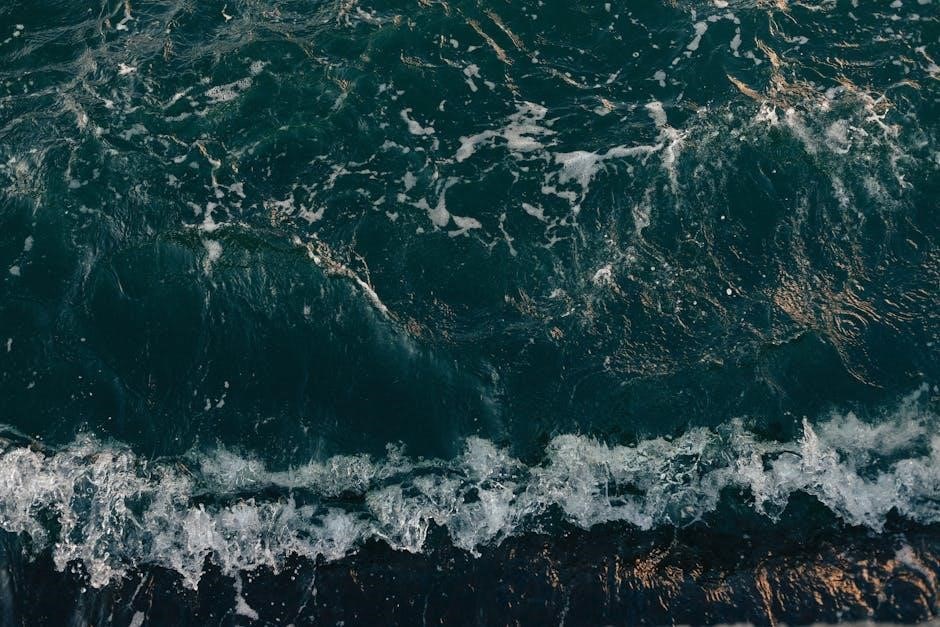
Protected and Endangered Species
Special protections apply to endangered species like sea turtles and certain sharks․ Anglers must release these species unharmed and avoid gear that causes unnecessary harm․ Conservation efforts prioritize their survival and habitat protection to maintain biodiversity in New Jersey’s marine ecosystems․
Species Under Special Protection
Several marine species, including sea turtles, certain shark species, and juvenile fish, are under special protection in 2024․ Handling these species requires care to avoid injury, and releasing them unharmed is mandatory․ Gear restrictions, such as the use of circle hooks, are enforced to minimize bycatch and protect vulnerable species․ Anglers must adhere to specific guidelines to ensure the survival of these protected species․ Failure to comply may result in penalties․ For detailed information, refer to the 2024 NJ Saltwater Fishing Regulations PDF guide․
Conservation Efforts and Guidelines
New Jersey’s 2024 saltwater fishing regulations emphasize conservation through sustainable practices․ Circle hooks are mandatory for bait fishing to reduce bycatch and protect marine life․ Anglers are encouraged to handle fish gently and release them unharmed when necessary․ The state promotes catch-and-release fishing for certain species to maintain healthy populations․ Additionally, the Saltwater Recreational Registry Program helps track fishing activities, ensuring data-driven conservation decisions․ By adhering to these guidelines, anglers contribute to the long-term sustainability of New Jersey’s marine ecosystems․
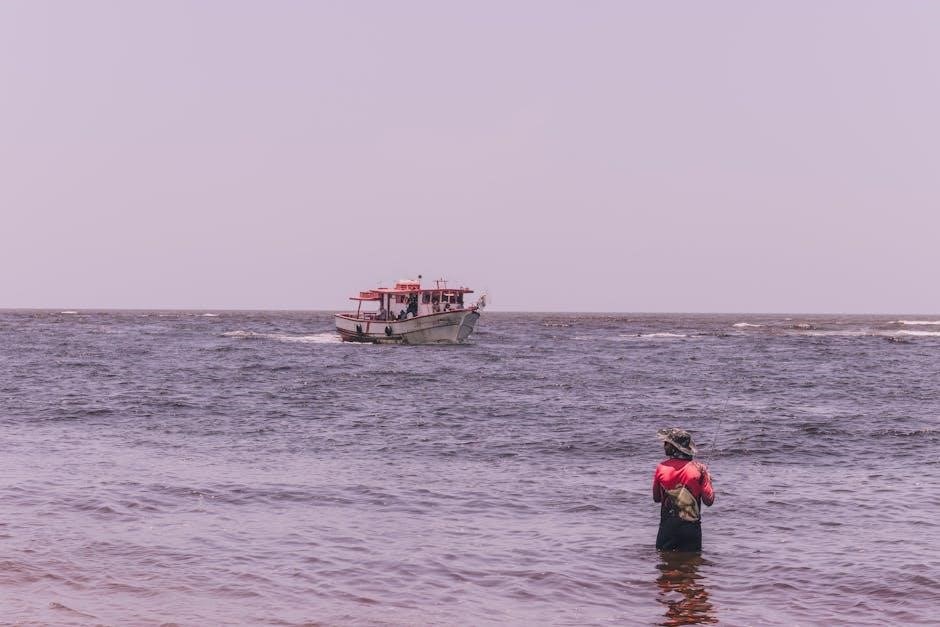
Fines and Penalties for Violations
Violating 2024 NJ saltwater fishing regulations can result in substantial fines and legal action․ Penalties are strictly enforced to ensure compliance and protect marine resources effectively․
Penalties for Non-Compliance
Non-compliance with 2024 NJ saltwater fishing regulations can result in significant fines, ranging from hundreds to thousands of dollars, depending on the violation․ Penalties may include fines for undersized fish, exceeding bag limits, or fishing during closed seasons․ Repeat offenses can lead to increased penalties or even license revocation․ Enforcement is strict to protect marine resources and ensure fair access for all anglers․ Violators are encouraged to familiarize themselves with the regulations to avoid legal consequences and support conservation efforts․
Reporting Violations
Reporting violations of 2024 NJ saltwater fishing regulations is crucial for maintaining marine resource integrity․ Anglers are encouraged to contact the New Jersey Department of Environmental Protection or local marine enforcement agencies if they witness illegal activities․ Violations can also be reported through the NJ Fish and Wildlife website or by calling Marine Fisheries staff at 609-748-2020․ Public awareness and timely reporting help prevent overfishing, protect endangered species, and ensure compliance with conservation efforts․ Your involvement supports sustainable fishing practices for future generations․
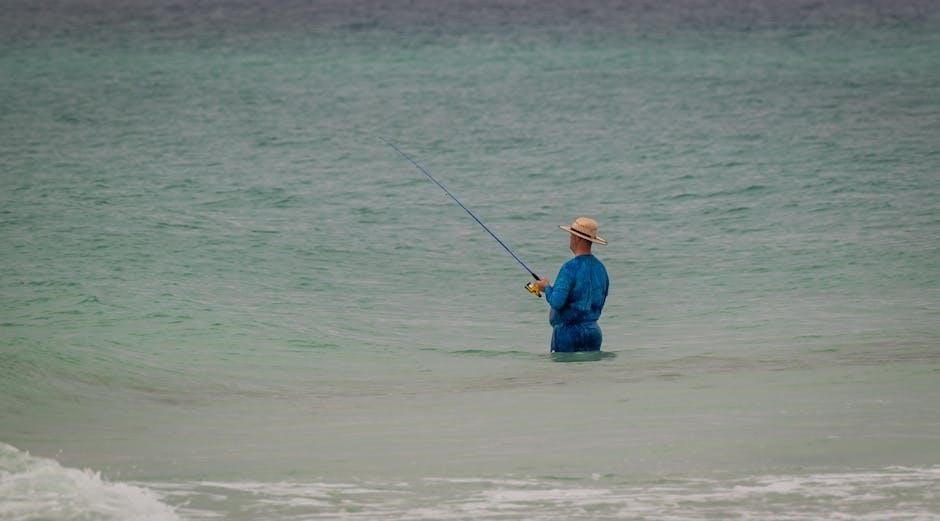
Gear Restrictions and Requirements
Circle hooks are mandatory for bait fishing to reduce bycatch and promote sustainable practices․ Proper handling and release methods are encouraged to ensure fish survival and conservation․
Approved Fishing Gear and Equipment
Approved fishing gear includes circle hooks, which are mandatory for bait fishing to reduce bycatch and promote sustainable practices․ Non-offset, non-stainless circle hooks are required when using live or dead baits․ Gear restrictions aim to protect vulnerable species and habitats․ Prohibited gear includes certain types of nets and traps that can cause environmental harm․ Anglers must ensure all equipment complies with state regulations to avoid penalties․ Detailed gear specifications can be found in the official 2024 NJ Saltwater Fishing Regulations PDF․
Circle Hook Requirements
Circle hooks are mandatory for all bait fishing in New Jersey saltwater areas to minimize bycatch and protect marine life․ Non-offset, non-stainless circle hooks are required when using live or dead baits․ This regulation aims to reduce fish mortality and promote sustainable fishing practices․ Anglers must ensure compliance with these requirements to avoid penalties․ Proper handling and release techniques are also encouraged to further conserve fish populations․ For detailed specifications, refer to the official 2024 NJ Saltwater Fishing Regulations PDF․
Downloadable 2024 NJ Saltwater Fishing Regulations PDF
The official 2024 NJ Saltwater Fishing Regulations guide is available as a free, downloadable PDF․ It includes essential details on seasons, size limits, and possession restrictions․ Anglers can access the guide via the NJ Fish and Wildlife website or through the eRegulations platform․ This document ensures compliance with state and federal regulations, providing anglers with a comprehensive reference for a successful fishing season․
How to Access the PDF Guide
The 2024 NJ Saltwater Fishing Regulations PDF can be easily accessed online․ Visit the NJ Fish and Wildlife website or the eRegulations platform․ Additionally, the New Jersey Sea Grant Consortium offers a free downloadable version․ Simply navigate to the marine fisheries section, select the 2024 guide, and download the PDF․ The document is also available through the NJSGC website․ Ensure you have the latest version for accurate and up-to-date information before your fishing trip․
Key Features of the Guide
The 2024 NJ Saltwater Fishing Regulations PDF offers comprehensive details on species-specific rules, including size limits, bag limits, and seasonal closures․ It also outlines licensing requirements and the Saltwater Recreational Registry Program․ The guide provides a ruler for measuring fish, ensuring compliance with size restrictions․ Additionally, it includes information on protected species and conservation efforts․ The PDF is designed to be user-friendly, making it easy for anglers to stay informed and adhere to regulations․ Regular updates ensure the guide reflects the most current rules and guidelines for sustainable fishing practices in New Jersey waters․